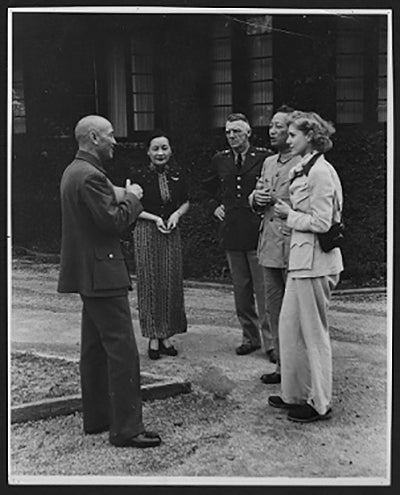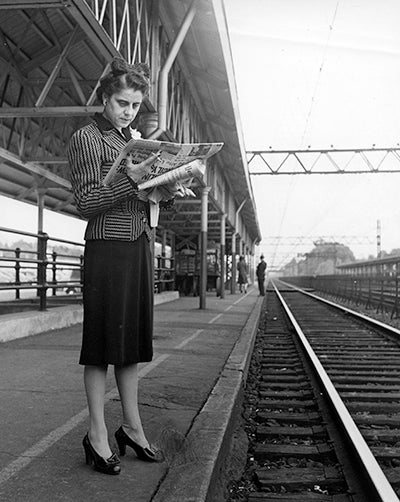Throughout much of human history, women provided often unpaid support and been the unrecognized mainstays to what was perceived as the greater work of men. Back in the day, a woman’s workplace was in the home, where she labored with little or no recognition and certainly without pay. Over time, women have broken out of traditional roles to find employment outside of their homes, and increasingly, even to become entrepreneurs forming their own innovative businesses.
The women’s archives at the BFCSC include personal papers of some these courageous and creative women who earned their livings and were engaged in world politics and women’s rights issues as journalists, writers, diplomats and business owners.
Sylvia Beach (1887-1962) founded the famous bookshop and lending library, Shakespeare and Company, in Paris in 1919. The bookshop was a literary hub between the world wars for artists and writers including Sherwood Anderson, Simone de Beauvoir, Stephen Vincent Benet, T.S. Eliot, Andre Gide, Ernest Hemingway, Wyndham Lewis, Archibald MacLeish, Ezra Pound, Gertrude Stein, Paul Valery, Thornton Wilder, and William Carlos Williams.
John L. Brown Papers 1, GTM.Gamms167
Anna M. Brady (1901-1999) was a journalist and veteran correspondent on Vatican affairs. Based in Rome for 29 years, she covered the conclaves that elected Popes John XXIII, Paul VI, John Paul I, and John Paul II; as well as all sessions of Vatican II and the early subsequent synods. During her Vatican II years, she was dubbed “dean” of the Vatican Press Corps and was a welcomed member of the daily press corps briefings at each session. Brady was the only woman ever permitted to travel on the papal plane to accompany Pope Paul VI on his first five pilgrimages to the Holy Land, Bombay, Fatima, the United Nations in New York, and Istanbul.
Anna M. Brady papers, GTMGamms330
Clinch Calkins (1895-1968), was a novelist and poet. Her most critically acclaimed book was Some Folks Won’t Work (1930), a seminal document on the Depression, based on 300 individual case histories of the effects of unemployment. Published a year following the Wall Street Crash, the book received accolades on the front page of the New York Times Book Review, and brought Calkins national attention along with an invitation from Harry Hopkins (advisor to Franklin D. Roosevelt) to work with the Federal Emergency Relief Administration (FERA). Calkins travelled across country reporting on socioeconomic conditions and ghost-writing for Hopkins.
Clinch Calkins papers, GTM000622
Carmen Callil (1938- ), is an Australian critic, publisher, writer, and founder of the Virago Press dedicated to publishing female authors.
Antonia White – Carmen Callil papers, GTM120607

Clare Boothe Luce. Photograph with Chiang Kai Shek
and wife in Burma, 1942
(Clare Boothe Luce Photographic Collection, GTM.Gamms265, 2:26a)
Clare Boothe Luce (1903-1987) was an editor for such well-known magazines as Vogue in 1930, and the Condé Nast magazine Vanity Fair from 1929 until 1934. Dwight D. Eisenhower appointed her as ambassador to Italy from 1953 to 1957. Throughout her life, Luce was involved in many humanitarian organizations including the American Friends of Captive Nations, American Security Council, International Rescue Committee, and U.S. Committee for Refugees, among others.
Clare Boothe Luce Photographic Collection, GTM.Gamms265

Photograph of Sergio at railway station. Undated.
Credit: Hans J. Knopf Pix Incorporated, New, York.
(Lisa Sergio Papers, GTM.Gamms172; 14:51) Reproduced from original
Lisa Sergio (1905-1989) was a radio news commentator who fled Mussolini’s regime and emigrated to the U.S., where she worked for over five decades as a radio commentator and television host for major broadcasters such as ABC and NBC. She also lectured extensively on human rights, women’s rights, the detrimental effect of war, and promotion of peace.
Lisa Sergio Papers, GTM.Gamms172
Norah Tracey (1903-? ), was a bespoke milliner and dressmaker who worked independently from home.
--Lisette Matano, Manuscripts Archivist
March 31, 2017
